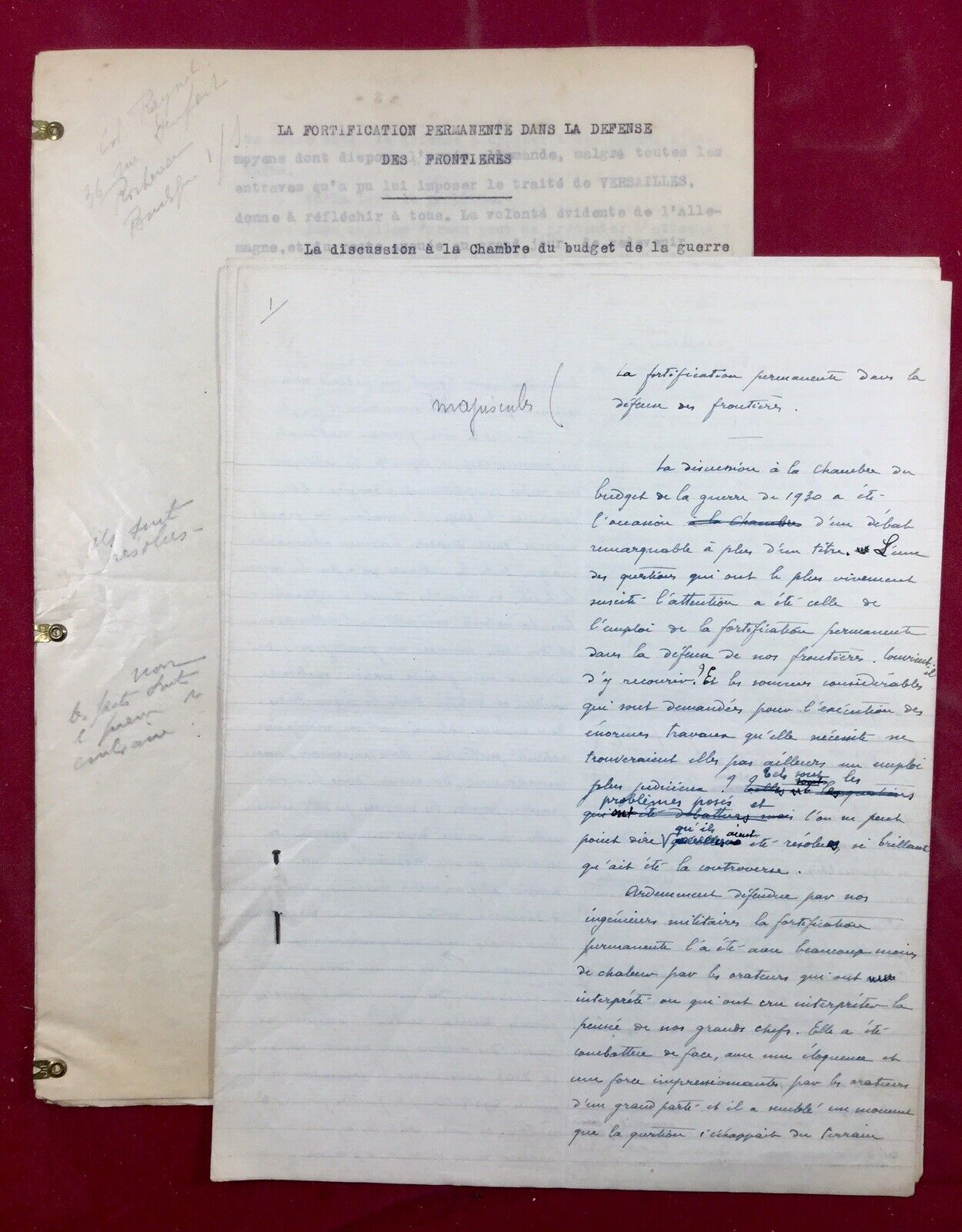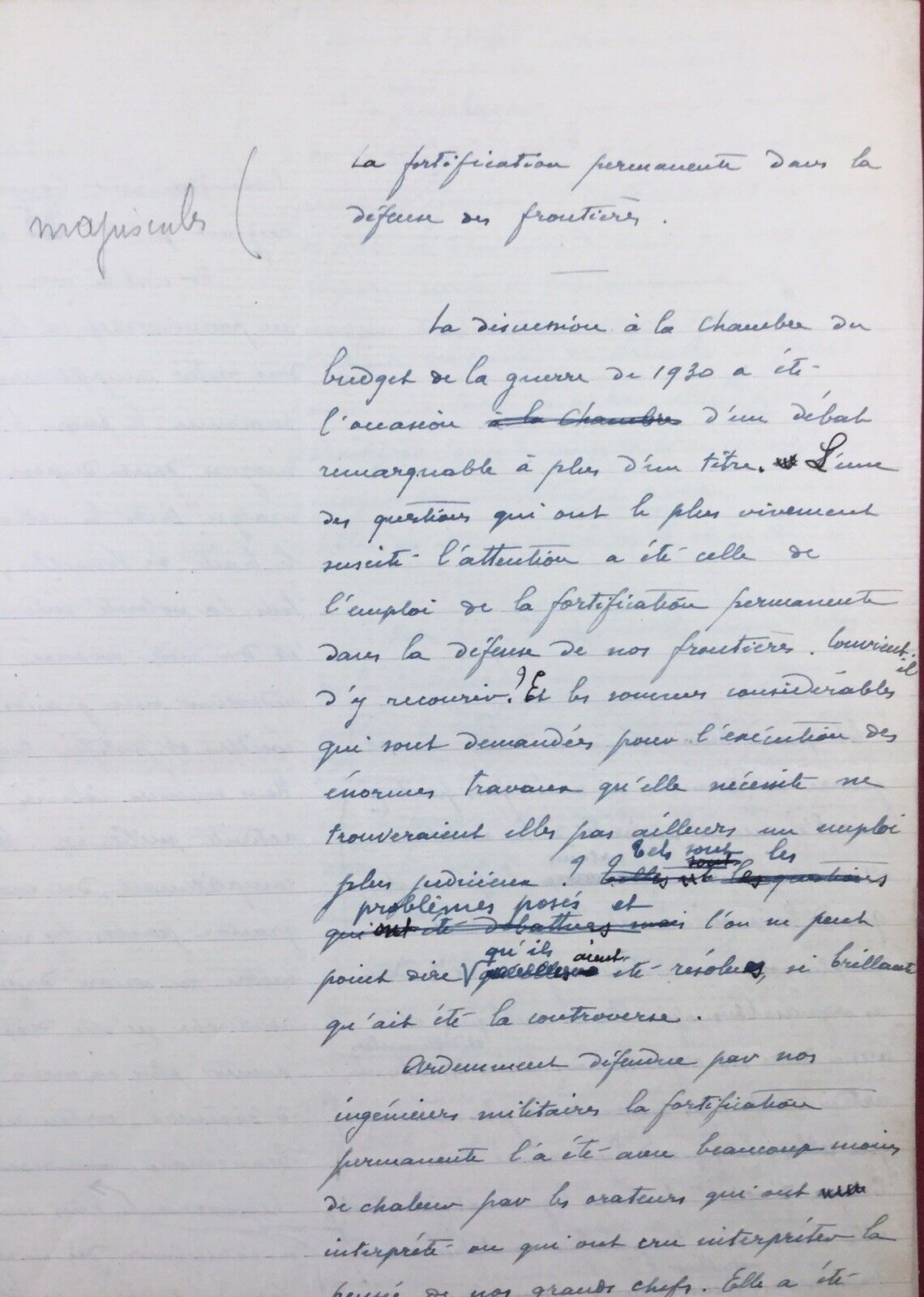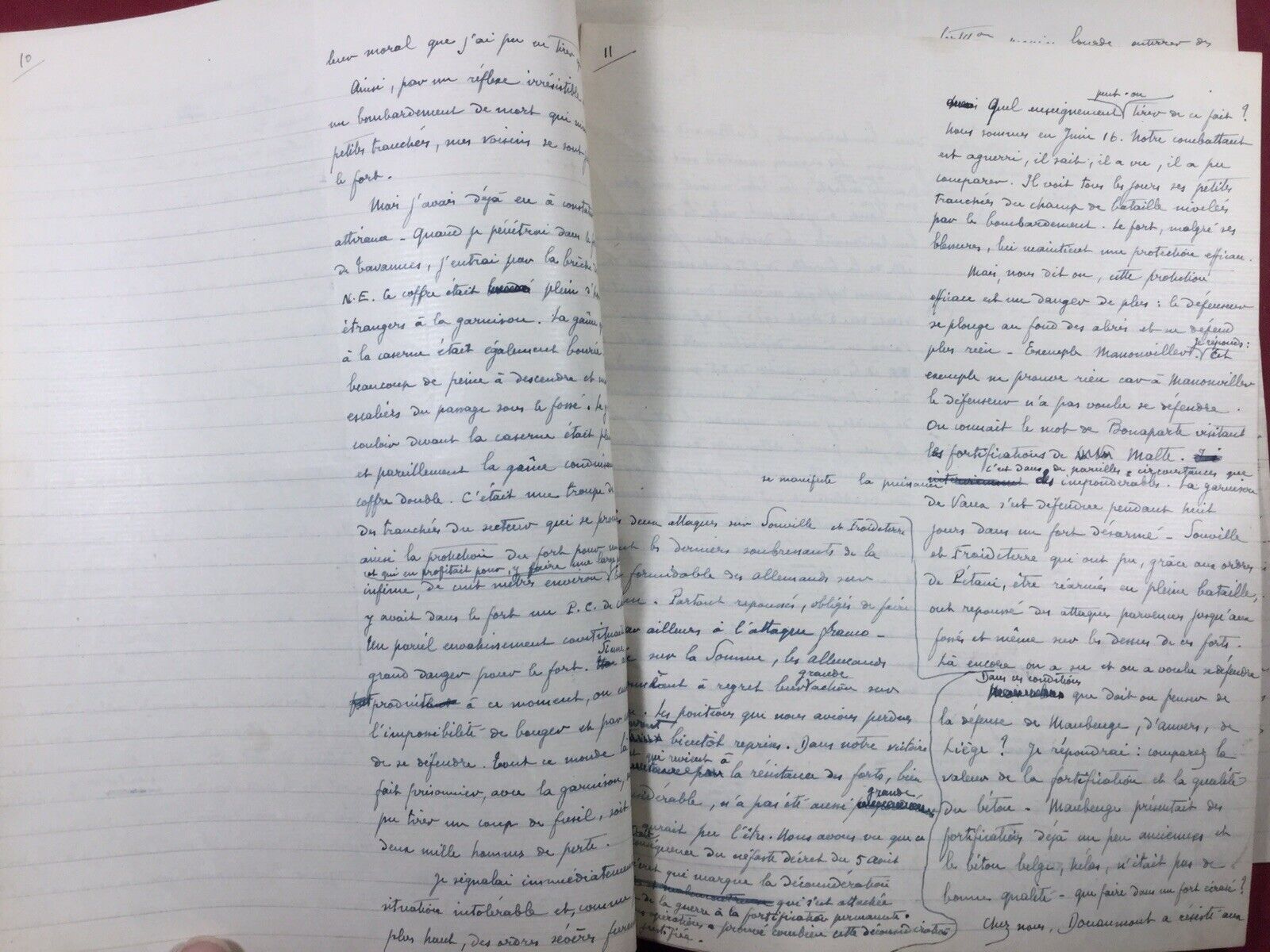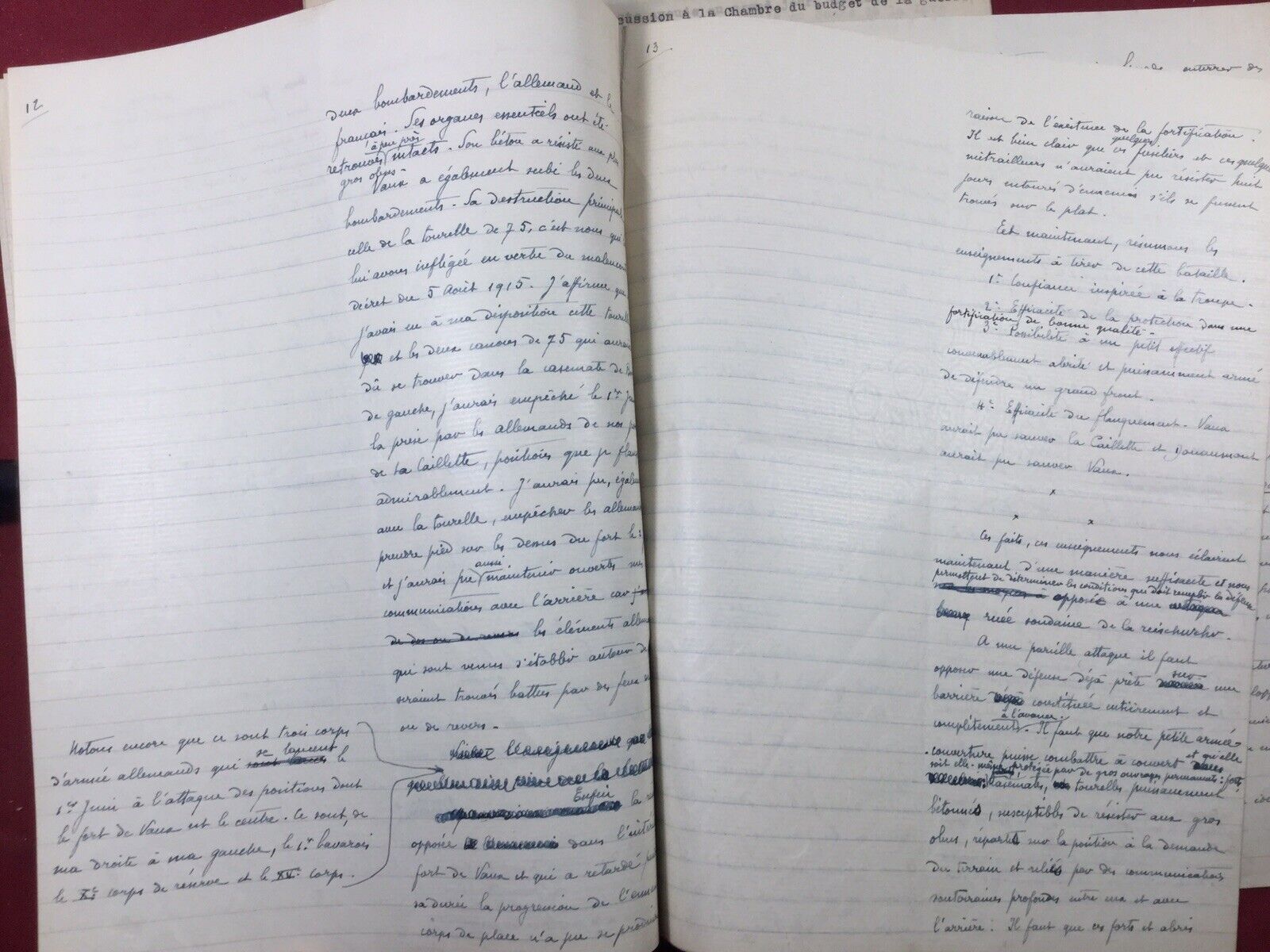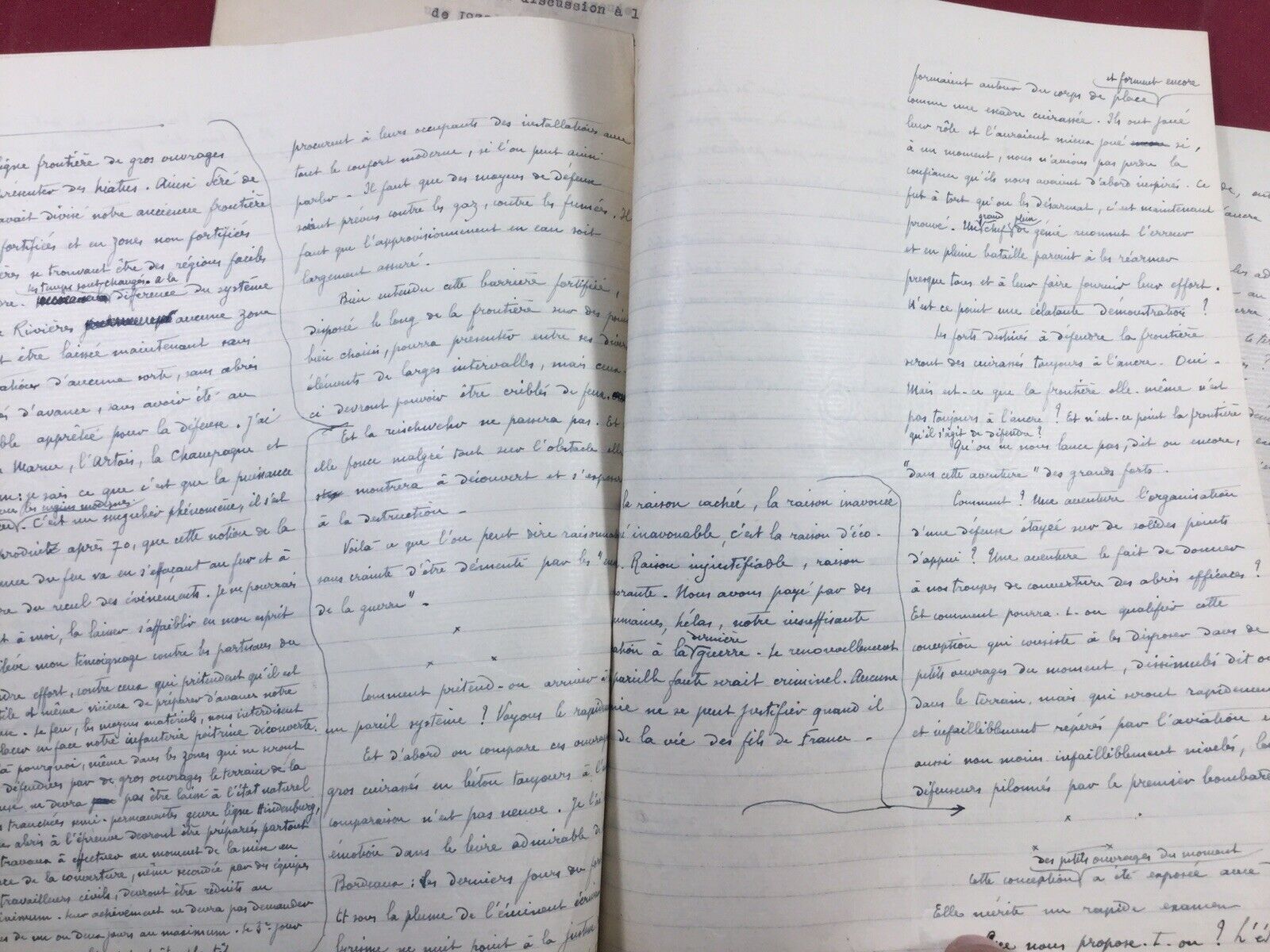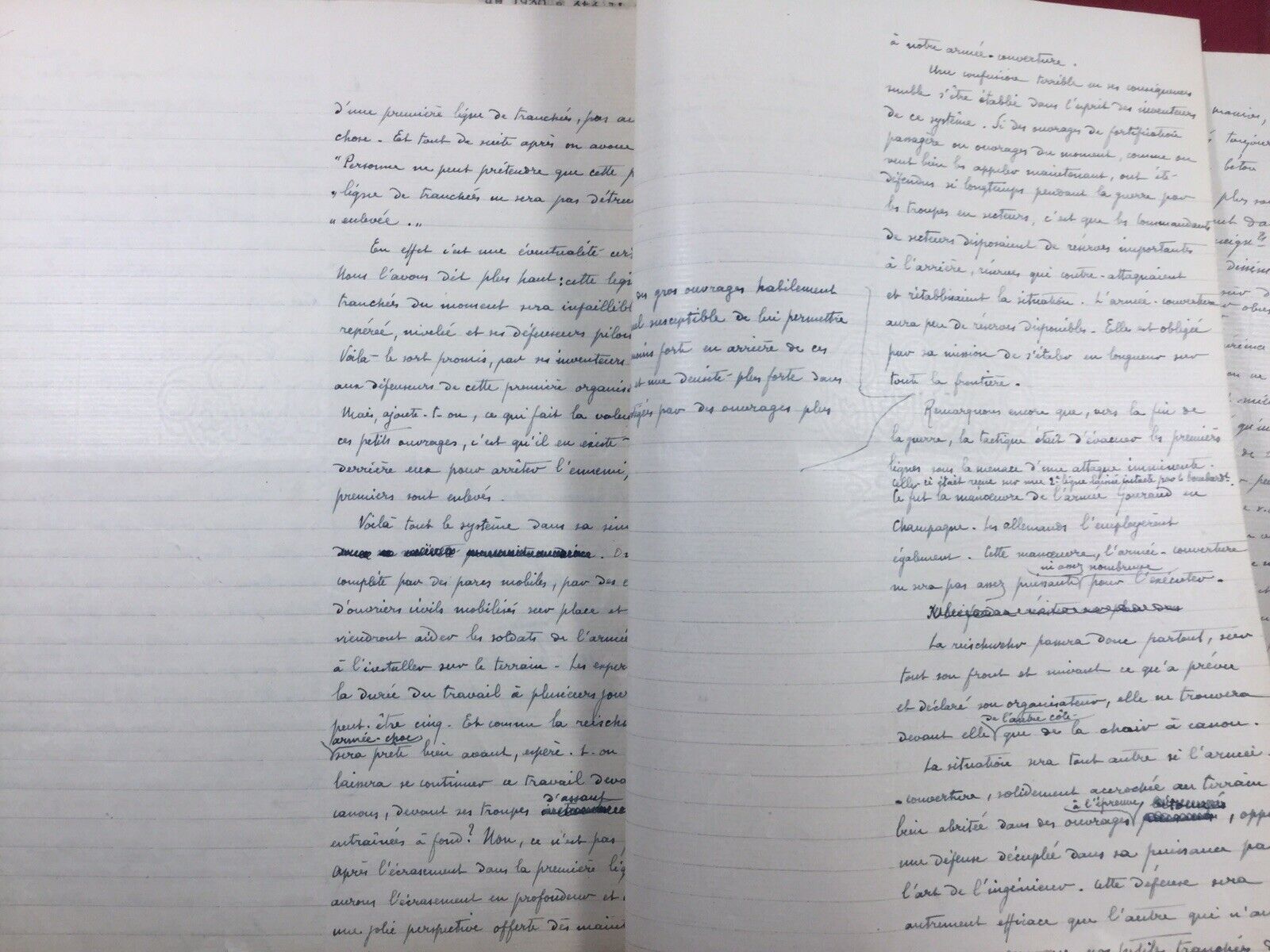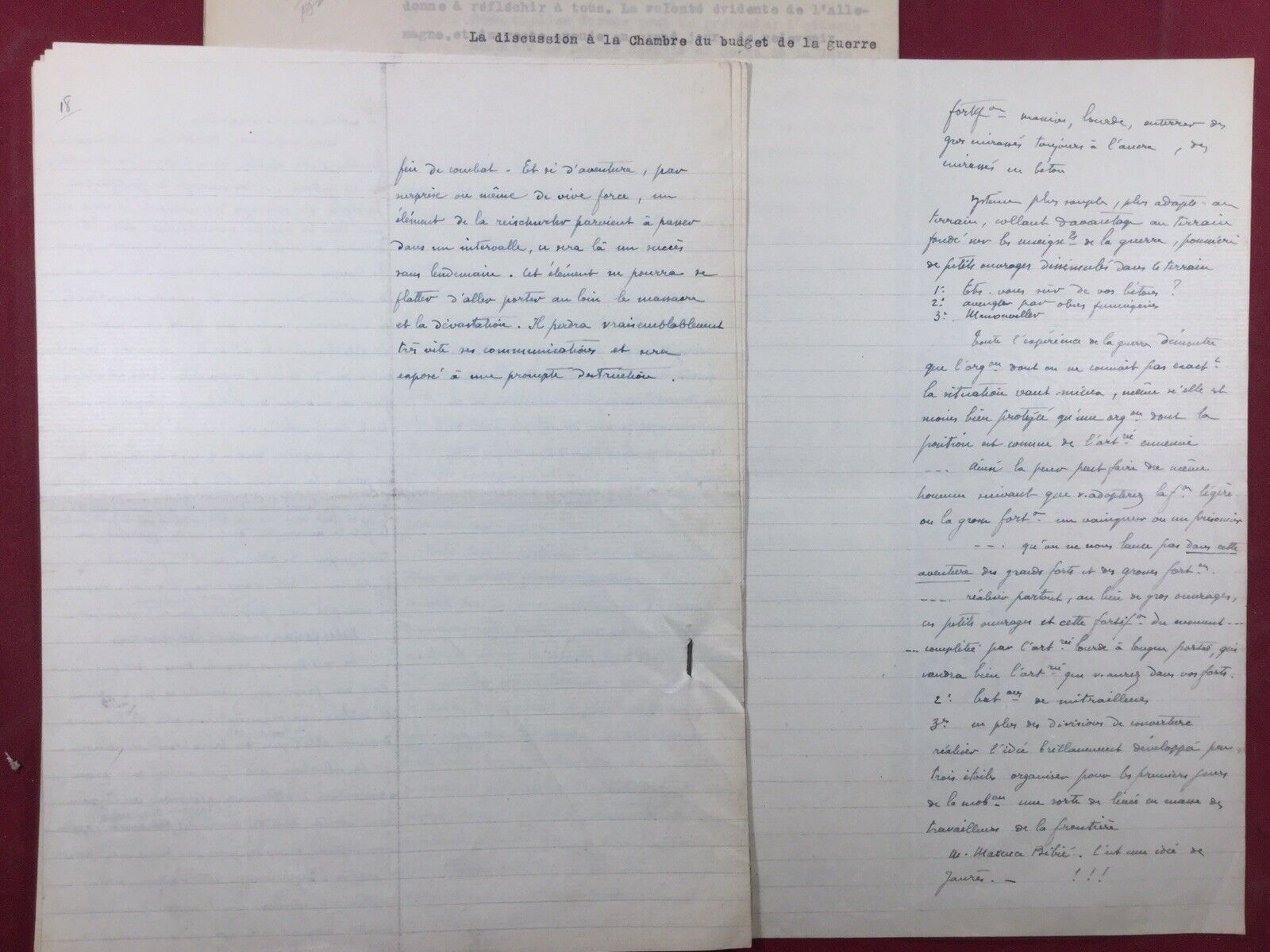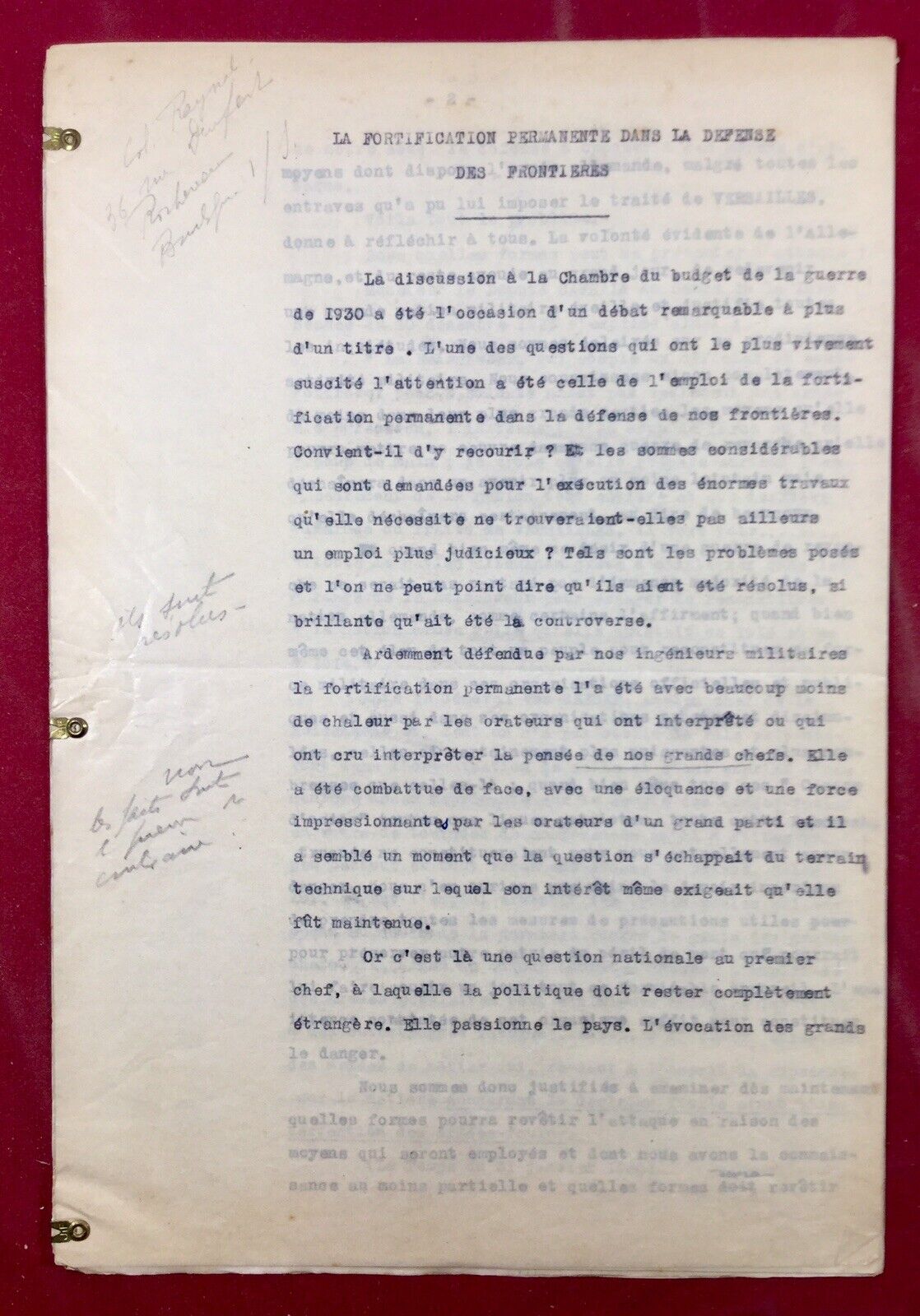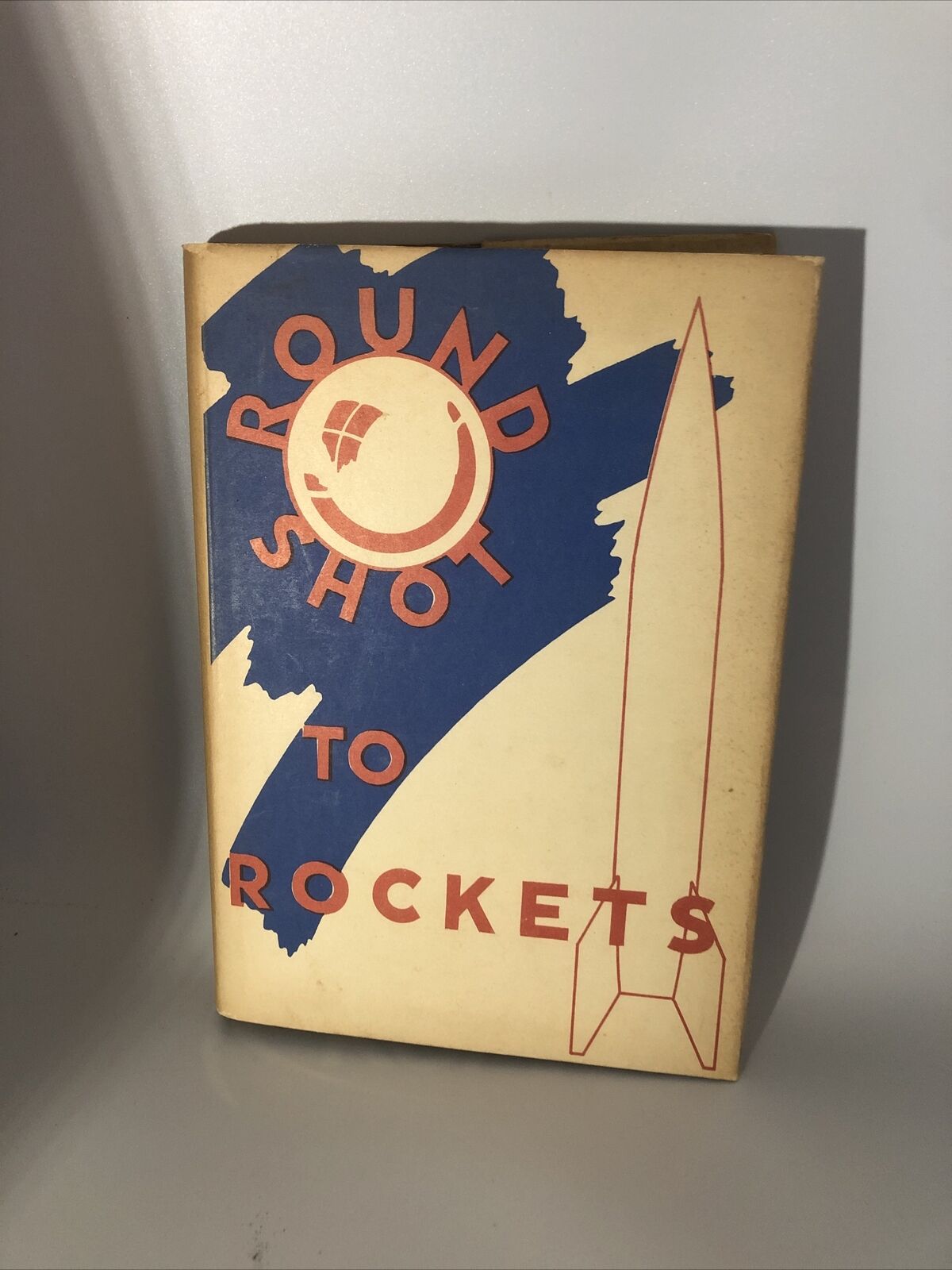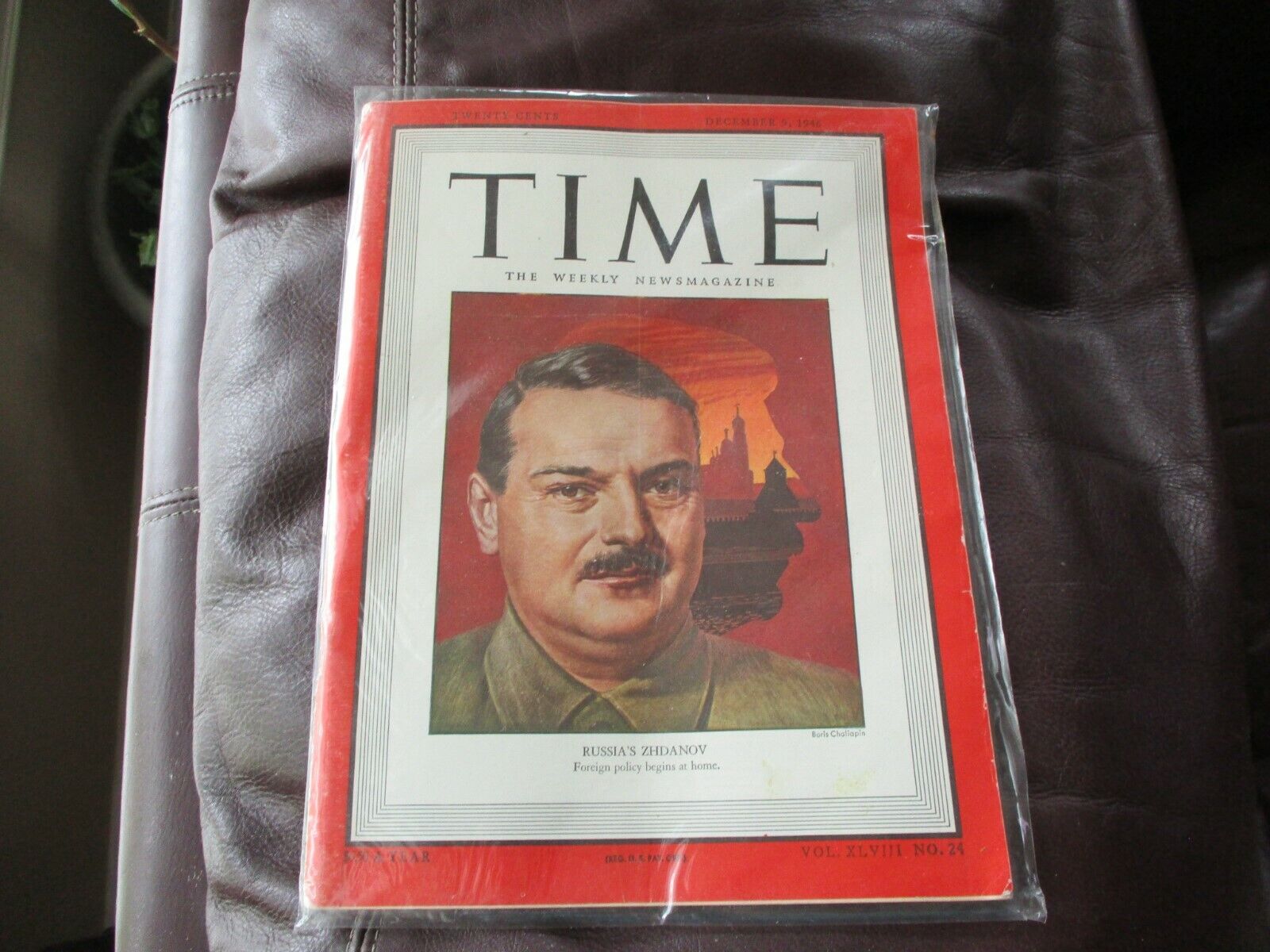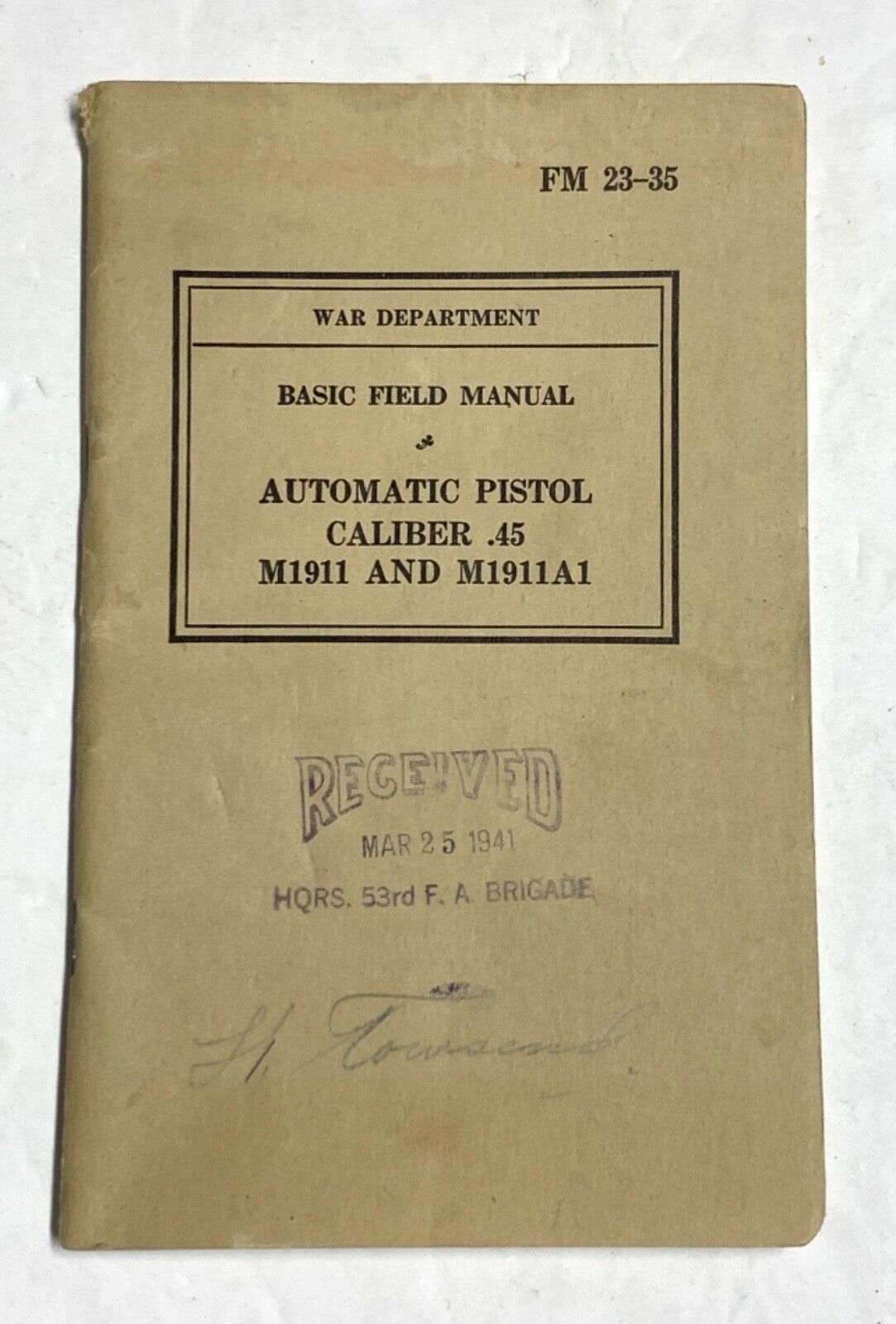-40%
Commandant Raynal Extremely Rare Manuscript Original 1930 Fortifications Défense
$ 104.19
- Description
- Size Guide
Description
Extremely Rare Original Manuscript of Commander Raynal written in 1930 Permanent Fortification in the Defense of Borders. Extraordinary historical document of 20 pages written by the hand of Commander Raynal. A text written for the parliamentary debates in January 1930.We associate this important document with its 32-page mimeographed version.
We only sell authentic and original documents.
We accept payment by check.
Wikipedia source
Sylvain Eugène Raynal, born March 6 Mars 1867 in Bordeaux (Gironde) and died January 13, 1939 in Boulogne-Billancourt (Hauts-de-Seine), was a French officer. His role, considered heroic, in the defense of Fort Vaux during the Battle of Verdun, earned him the honors of the French and German staffs.
The command post of Fort de Vaux with a representation of its leader.
Sylvain Raynal was born on March 6 Mars 1867 in Bordeaux to a family from Tarn-et-Garonne. His father, enlisted in 1870 for the duration of the war, then retired to Angoulême where he worked as a bootmaker. In 1877, Sylvain entered the high school of this city [SER 1].
Before the war, Sylvain Raynal engaged in strong civic actions. He supports the action of Jaurès[1] and the Socialist Party. Close to Commander Rossel[N 1],[2], collaborator of Jaurès for L'Armée nouvelle and the military section of L'Humanité, he was involved in running the socialist summer camp "Le Grand Air"[ 3].
Military career Edit
In 1885, Sylvain Raynal enlisted in the 123rd infantry regiment then moved to the 107th in Angoulême, prepared for the military school at Saint-Maixent-l'École and graduated first. He asks for and obtains his assignment to the 3rd regiment of riflemen of Constantine. In 1902, he was promoted to captain and transferred to the Falaise depot of the 5th infantry regiment in Paris. In Mars 1913, he was transferred with the rank of major to the 7th regiment of native skirmishers. He was appointed battalion commander there a few months later and was in this position at the start of the conflict [SER 1].
At the start of the war, he was wounded several times in combat: in September 1914 during the Battle of the Marne then north of Arras, in November 1914, during the bombardment of his command post. He was hospitalized for ten months before returning to combat on October 1, 1915. Following a new injury in the fall of 1915 in Champagne, caused by a shot of shrapnel, Raynal underwent a new convalescence[4]. His various injuries earned him the promotion of Officer of the Legion of Honor on January 11, 1916[5].
Still convalescing in February 1916, he only walked with difficulty and the war seemed over for him. It was then that the Ministry of War announced that officers who could not serve in the front line because of their injuries could be appointed to the command of fortresses. Having volunteered, Raynal asked to serve at Verdun where the Germans had just launched their offensive.
At the end of May 1916, at the head of 600 men surrounded in the defensive keystone of Fort Vaux, isolated from the French lines, he alone resisted the assaults of German elite troops commanded by the Kronprinz, son of Emperor William II. from Germany. Thirsty, malnourished, his troops fought to their ultimate limit, hampering the German offensive. His resistance, described as heroic by the French general staff, is considered one of the tipping points of the Battle of Verdun, finally won at the end of 1916 by the French army.
During the siege, on June 6, 1916, Commander Raynal was elevated to the rank of Commander of the Legion of Honor[5], an appointment accompanied by the citation in the agenda:
“Raynal (Sylvain Eugène), battalion commander in the 96th train regiment, commanding Fort Vaux. Insufficiently recovered from a serious injury and unable to be replaced at the head of a field unit, was appointed at his request to the command of Fort Vaux. Isolated in this work by a violent bombardment has, for six days, repelled the repeated assaults of the enemy infantry, disputing step by step each corridor, each casemate, and now to the end by his example, the unshakable firmness of the garrison[6]. »
Short of ammunition, water, food and men, attacked with gas, Commander Raynal sent a carrier pigeon to the rear on June 4, 1916 to obtain final instructions. Without a response from the general staff, he postponed the surrender of Fort Vaux on June 7, 1916.
To salute the stubbornness and tenacity of the defenders of Fort Vaux, the attacking German troops spontaneously organize a guard of honor for the besieged [SER 2] who lay down their arms. Impressed by the French resistance and by the homage rendered by its own troops to the adversary, the Kronprinz summons Commander Raynal to his headquarters where he expresses his admiration for his bravery. In an unusual gesture for the 1914-1918 war, the Kronprinz solemnly hands Raynal the straight razor of an engineer sapper, telling him: "I could only find this weapon... please accept it... because your saber was not found at Fort Vaux” [SER 3]. A few minutes later the kronprinz gave Raynal a French officer's saber “which he had sought and found in Stenay”[SER 4].
In captivity, on June 11, 1916, at the citadel of Mainz then in Strassburg, south of Königsberg in (East Prussia)[SER 5], on November 5, 1917, he was then interned in Interlaken (Switzerland)[SER 6] on Mars 1918. He was released on November 4, 1918 and appointed lieutenant-colonel on December 29, 1918[SER 1].
In 1920 he was military commander of the city of Mainz then was in Syria from 1921 to 1926 where he was promoted to colonel in January 1925[SER 1]. There he commanded the troops of the Alawite region and, as deputy to Generals Michaud and Gamelin, took part in operations against the Druze [SER 1]. Although admitted to retirement in Mars 1926, he was in charge of a mission in Syria until May 1929[SER 1].
He died of a heart attack at his home on January 13, 1939[7].
Honors Edit
Colonel Raynal holds several decorations:
1
2
3
4
5
Click on a thumbnail to enlarge it.
Officer's Medal of the Legion of Honor;
tie of Commander of the Legion of Honor;
medal of the war cross 1914-1918;
Medal of Knight of Academic Palms;
Tunisian order of Nichan Iftikhar.
Tributes Edit
A plaque was affixed in 1966, on the occasion of the fiftieth anniversary of the Battle of Verdun, on his last home, at No. 36 rue Denfert-Rochereau in Boulogne-Billancourt[4].
A municipal decree of November 27, 1998 gave a private road in the 15th arrondissement of Paris the name of Commander Sylvain Eugène Raynal[8].
Bordeaux has a Place du Colonel-Raynal, Angoulême and Beausoleil have a Place du Commandant-Raynal. Le Mans, Mérignac, Périgueux, Étretat, Montville, Montpon-Ménestérol, Montreuil and Saint-Dizier have a rue du Colonel-Raynal, Nîmes, Béziers, Montauban, Saint-Quentin, La Roche-sur-Yon, Le Perreux-sur- Marne, Houilles, Neuilly-Plaisance, Viroflay, Castelnaudary, Belleville-sur-Meuse one rue du Commandant-Raynal. Compiègne has a Square du Commandant-Raynal. Verdun, like Toulon, has a Commandant-Raynal impasse.
In 1885, Sylvain Raynal enlisted in the 123rd infantry regiment then moved to the 107th in Angoulême, prepared for the military school at Saint-Maixent-l'École and graduated first. He asks for and obtains his assignment to the 3rd regiment of riflemen of Constantine. In 1902, he was promoted to captain and transferred to the Falaise depot of the 5th infantry regiment in Paris. In Mars 1913, he was transferred with the rank of major to the 7th regiment of native skirmishers. He was appointed battalion commander there a few months later and was in this position at the start of the conflict [SER 1]. To salute the stubbornness and tenacity of the defenders of Fort Vaux, the attacking German troops spontaneously organize a guard of honor for the besieged [SER 2] who lay down their arms. Impress
